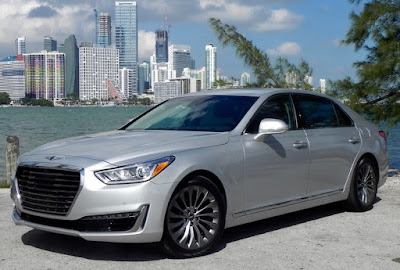MANUAL TRANSMISSIONS FADING, BUT GENESIS OFFERS ONE ON 2020 G70 SEDAN
With automatic transmissions coming with Sport and Sport+ modes and manual gear selection via paddle shifters mounted to the steering wheel or, in some cases, the steering wheel column, vehicles equipped with manual transmissions continue to fade from the market.According to various sources such as Carfax.com and autowise.com, just over 40 vehicles for 2020 come with the capability of the traditional clutch and shift operation, which sounds like a decent number of options.
That is, at least until you consider that a study late last year showed that sales of electric cars nearly doubled those for vehicles with manual transmissions. Just over 1.1 percent of buyers went for a manual model compared to just under 2 percent for an electric car.
Not even the new Chevrolet Corvette, long recognized as America’s Sports Car, is offered with a manual transmission. The C8 model not only is the first mid-engine Corvette but also the first to be offered with an automatic only.
Part of that has to do with the design elements of accommodating the new powertrain, but the rest is because of slow sales of manually equipped C7 versions in recent years. A report in Car & Driver quoted chief engineer chief engineer Ed Piatek as saying that sales of the C7 Corvette with a manual gear box had dwindled from 50 percent in 2014 to less than 20 percent in 2019.
We’ll see if enough Corvette purists demand Chevy reconsider its decision, but the fact that the C8 Corvette is zipping from zero-to-60 mph in under three seconds with its double-clutch automatic likely will stifle momentum for the manual.
I am not a purist, and I do like most of the responses I get when driving in Sport mode, but I get my most enjoyment when the test vehicle that shows up in my driveway on a weekly basis is a manual, usually a 6-speed these days. (I harbor strong memories of a 1963 Ford Falcon Sprint convertible with “4 on the floor” I had back in the day.)
Regrettably, it doesn’t happen often, but it did recently when I was delivered a new Genesis G70 sedan.
The G70 comes with a choice of two turbocharged engines, a 3.3-liter V6 and a 2.0-liter inline 4 with either rear-wheel or all-wheel drive.
While an 8-speed automatic is the more common transmission, a 6-speed manual also is available with the 2.0T 4-cylinder G70 with RWD. The manual model also comes with a performance package that gives horsepower a slight boost to 255 (torque remains at 260 pound-feet) and adds a sport exhaust and Brembo brakes with enhanced performance pads.
Interestingly, the listed MSRP of $38,500 for the 2.0T Sport model with the manual is more than even the $37,450 base for the AWD 2.0T with an automatic, which is the reverse of what is usually the case.
 Automatic transmissions used to pretty much always come with a premium over manuals and offer slightly less than in the way of fuel mileage, but with the G70 it’s just the opposite. The 2.0T the automatic has EPA numbers of 22 miles-per-gallon city, 30 highway and the manual 16/28 mpg.
Automatic transmissions used to pretty much always come with a premium over manuals and offer slightly less than in the way of fuel mileage, but with the G70 it’s just the opposite. The 2.0T the automatic has EPA numbers of 22 miles-per-gallon city, 30 highway and the manual 16/28 mpg.I’ll sacrifice that.
Standard equipment in the 2.0T Sport RWD includes proximity key and push-button start, LED headlights and taillights, LED daytime running lights, leatherette seating surfaces, 16-way power adjustable driver’s seat with 4-way lumbar, 8-way power adjustable front passenger seat, heated and ventilated front seats, aluminum interior trim, power tilt-and-telescopic steering wheel, perforated leather-wrapped steering wheel, 8-inch display screen for audio with Apple CarPlay and Android Auto, Lexicon premium sound, Bluetooth hands-free communications, three USB ports, and hands-free trunk with auto open.
 Safety features include Forward Collision Avoidance Assist with Pedestrian Detection, Blind Spot and Rear Cross-TrafficWarning, lane-keeping assist, rearview camera with parking guidelines, Hill Start Assist control, and a Driver Attention Warning.
Safety features include Forward Collision Avoidance Assist with Pedestrian Detection, Blind Spot and Rear Cross-TrafficWarning, lane-keeping assist, rearview camera with parking guidelines, Hill Start Assist control, and a Driver Attention Warning.The Driver Attention Warning may come in handy on long road trips, but I think that manual models by their nature demand your attention more than automatics. Just another benefit over the automatics!
(For my earlier review of the 2020 Genesis G70, see my reviews from November 2019 using the index on the right.)
 What I liked about the 2020 Genesis G70 2.0T Sport R/T: In addition to its great-looking exterior and classy cabin, I loved it coming with a 6-speed manual transmission. It has a high-class premium feel, and the infotainment features are very intuitive to operate.
What I liked about the 2020 Genesis G70 2.0T Sport R/T: In addition to its great-looking exterior and classy cabin, I loved it coming with a 6-speed manual transmission. It has a high-class premium feel, and the infotainment features are very intuitive to operate.What I didn’t like about the 2020 Genesis G70 2.0T Sport R/T: A small point, but the manual takes extra care to get into reverse. As with all G70s, the trunk is on the small side (10.5 cubic feet).














































